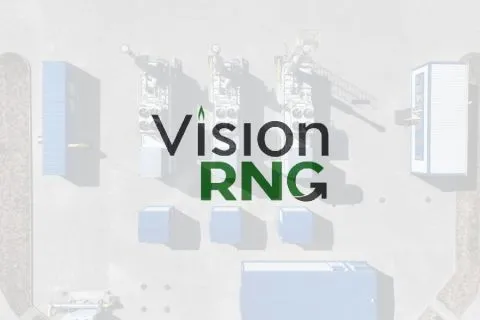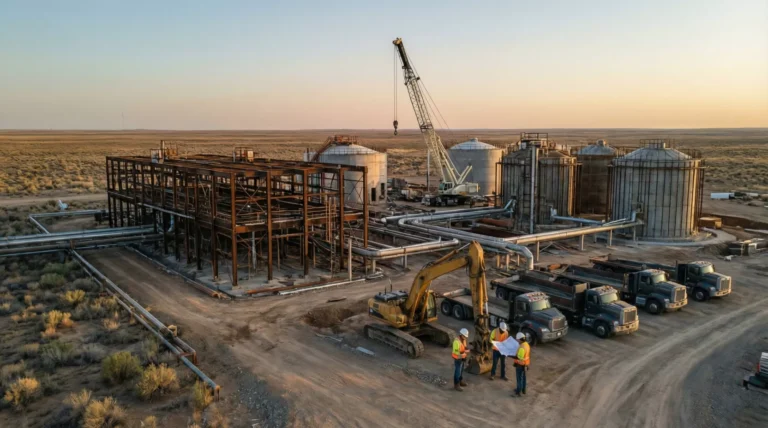
Vision RNG Closes $28.8 Million Tax Credit Sale Supporting Expansion of Laurel Ridge Renewable Energy Project
Vision RNG (VRNG), a prominent player in the renewable natural gas (RNG) industry, has announced the successful completion of a significant financial milestone: the $28.8 million sale of the investment tax credit (ITC) associated with its Laurel Ridge landfill gas-to-energy project located in Corbin, Kentucky. This move underscores Vision RNG’s commitment to advancing clean energy initiatives while leveraging key financial mechanisms to accelerate the growth of its renewable energy infrastructure.
A Strategic Sale to Fuel Sustainable Growth
The monetization of the ITC from the Laurel Ridge project reflects Vision RNG’s continued strategy to optimize financial resources through federal incentives, particularly those made available under the Inflation Reduction Act (IRA). By selling the ITC generated from the project, Vision RNG has effectively unlocked new capital that can be reinvested in its expanding national portfolio of renewable energy assets.
Kevin Johnson, Chief Financial Officer at Vision RNG, emphasized the strategic importance of this transaction. “We’re proud to have closed another successful tax credit transaction in support of our growing portfolio,” Johnson stated. “The proceeds from this sale will allow us to further invest in projects that deliver both strong environmental and economic returns.”
This transaction represents the latest in a series of successful moves by Vision RNG to capitalize on policy frameworks that support clean energy development. The IRA, enacted in 2022, introduced a variety of incentives designed to catalyze investment in renewable energy projects across the United States. The act has played a pivotal role in enabling developers like Vision RNG to make clean energy projects not only viable but financially attractive to institutional investors.
The Laurel Ridge Project: Clean Energy from Landfill Gas
The Laurel Ridge RNG facility is a flagship project developed in collaboration with Waste Connections, one of North America’s largest providers of solid waste services. Located in southeastern Kentucky, the project involves the capture and conversion of landfill gas—specifically methane—into pipeline-quality renewable natural gas. Methane is a potent greenhouse gas, and capturing it from landfills is one of the most effective strategies for reducing harmful emissions associated with organic waste decomposition.
Once captured, the methane is purified through a rigorous upgrading process to meet pipeline specifications. The end product is renewable natural gas, a clean and sustainable alternative to conventional fossil fuels. RNG can be used in a variety of applications, including residential heating, electricity generation, and as a transportation fuel for vehicles that run on compressed natural gas (CNG).
The environmental impact of this facility is significant. The Laurel Ridge project is expected to generate approximately 450,000 MMBtu of RNG annually. To put this in perspective, that’s enough energy to power more than 8,000 American homes each year. Even more impressive is the project’s carbon offset potential—it is estimated to reduce more than 30,000 metric tons of carbon dioxide equivalent (CO₂e) emissions annually. This is akin to removing more than 6,500 passenger vehicles from the road every year.

Institutional Support and Expert Advisory
The financial and legal structuring of the ITC sale was supported by a team of seasoned advisors. CRC-IB, a respected financial advisory firm specializing in renewable energy transactions, served as the financial advisor to Vision RNG. Legal advisory services were provided by Holland & Knight LLP, a law firm with deep expertise in tax equity and renewable energy law.
This collaboration ensured the transaction was executed efficiently, complying with all regulatory frameworks while maximizing value for Vision RNG. The involvement of these advisors highlights the complexity and importance of structuring such deals in a way that aligns with both market opportunities and long-term business goals.
The Laurel Ridge ITC sale follows a similar transaction involving Vision RNG’s Eagle Ridge project, further cementing the company’s ability to monetize the tax credits associated with its RNG facilities. These deals reflect a growing appetite among institutional investors and tax equity buyers for projects that offer strong returns while advancing environmental sustainability.
A Growing National Pipeline
With this latest transaction, Vision RNG continues to build momentum in its mission to become a national leader in RNG development. The company has several additional projects under development or in early-stage operations, each designed to transform methane from landfills into clean, usable energy.
What sets Vision RNG apart in a competitive renewable energy market is its vertically integrated approach. From project identification and permitting through engineering, construction, and ongoing operations, Vision RNG manages the full lifecycle of its RNG facilities. This enables the company to maintain high-quality standards, optimize efficiency, and ensure that environmental and community benefits are maximized.
Furthermore, Vision RNG is actively exploring partnerships with municipalities, waste service providers, and other landfill operators across the country to scale its impact. The success of the Laurel Ridge and Eagle Ridge projects serves as proof of concept for the economic and environmental viability of landfill gas-to-RNG conversion.
Federal Incentives Accelerating Deployment
At the core of Vision RNG’s financial strategy is its ability to leverage government incentives like the ITC to attract private capital. The Inflation Reduction Act significantly expanded the scope of tax credits available to renewable energy developers, including allowing for the transfer of certain credits to unrelated parties in exchange for cash—a key provision that made the Laurel Ridge ITC sale possible.
This legislative framework has transformed the landscape for renewable energy project financing. By providing long-term certainty and more flexible mechanisms for monetizing tax credits, the IRA has opened the door for a broader range of investors to participate in the energy transition. This has been particularly impactful for emerging sectors like RNG, which historically faced more limited access to capital compared to wind or solar projects.
By acting swiftly and strategically within this evolving policy environment, Vision RNG has positioned itself as an early mover, securing valuable capital while building investor confidence in the long-term viability of RNG as a scalable energy solution.
With the successful sale of the Laurel Ridge ITC now complete, Vision RNG is well-positioned to continue expanding its footprint in the renewable energy market. The company remains focused on identifying high-impact projects, securing advantageous financing structures, and forging strong partnerships to support the rapid deployment of its clean energy technologies.
“Our goal is not just to build projects,” said CFO Kevin Johnson. “It’s to build a cleaner, more sustainable energy future. Transactions like this one help make that possible by ensuring we have the capital to keep growing.”
Vision RNG’s ability to execute financially and operationally on complex projects like Laurel Ridge demonstrates the company’s leadership in this fast-growing industry. As more organizations look to meet sustainability goals and reduce carbon footprints, RNG solutions like those offered by Vision RNG are expected to play a critical role.










